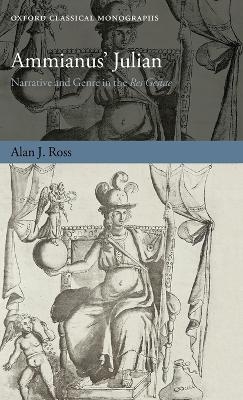
Ammianus' Julian
Narrative and Genre in the Res Gestae
Seiten
2016
Oxford University Press (Verlag)
978-0-19-878495-1 (ISBN)
Oxford University Press (Verlag)
978-0-19-878495-1 (ISBN)
This volume offers a major reinterpretation of Ammianus Marcellinus' Res Gestae, one of the main narrative sources for the political history of the later Roman Empire. Arguing for a re-examination of Ammianus' agenda and methods in depicting Julian, the last 'pagan' emperor, it re-analyses his narration of several key moments in Julian's reign.
Ammianus Marcellinus' Res Gestae holds a prominent position in modern studies of the emperor Julian as the fullest extant narrative of the reign of the last 'pagan' emperor. Ammianus' Julian: Narrative and Genre in the Res Gestae offers a major reinterpretation of the work, which is one of the main narrative sources for the political history of the later Roman Empire, and argues for a re-examination of Ammianus' agenda and methods in narrating the reign of Julian.
Building on recent developments in the application of literary approaches and critical theories to historical texts, Ammianus' presentation of Julian is evaluated by considering the Res Gestae within three interrelated contexts: as a work of Latin historiography, which consciously sets itself within a classical and classicizing generic tradition; in a more immediate literary and political context, as the final contribution by a member of an 'eyewitness' generation to a quarter century of intense debate over Julian's legacy by several authors who had lived through his reign and had been in varying degrees of proximity to Julian himself; and as a narrative text, in which narratorial authority is closely associated with the persona of the narrator, both as an external narrating agent and an occasional participant in the events he relates. This is complemented by a literary survey and a re-analysis of Ammianus' depiction of several key moments in Julian's reign, such as his appointment as Caesar, the battle of Strasbourg in 357AD, his acclamation as Augustus, and the disastrous invasion of Persia in 363AD. It suggests that the Res Gestae presents a Latin-speaking, western audience with an idiosyncratic and 'Romanized' depiction of the philhellene emperor and that, consciously exploiting his position as a Greek writing in Latin and as a contemporary of Julian, Ammianus wished his work to be considered a culminating and definitive account of the man and his life.
Ammianus Marcellinus' Res Gestae holds a prominent position in modern studies of the emperor Julian as the fullest extant narrative of the reign of the last 'pagan' emperor. Ammianus' Julian: Narrative and Genre in the Res Gestae offers a major reinterpretation of the work, which is one of the main narrative sources for the political history of the later Roman Empire, and argues for a re-examination of Ammianus' agenda and methods in narrating the reign of Julian.
Building on recent developments in the application of literary approaches and critical theories to historical texts, Ammianus' presentation of Julian is evaluated by considering the Res Gestae within three interrelated contexts: as a work of Latin historiography, which consciously sets itself within a classical and classicizing generic tradition; in a more immediate literary and political context, as the final contribution by a member of an 'eyewitness' generation to a quarter century of intense debate over Julian's legacy by several authors who had lived through his reign and had been in varying degrees of proximity to Julian himself; and as a narrative text, in which narratorial authority is closely associated with the persona of the narrator, both as an external narrating agent and an occasional participant in the events he relates. This is complemented by a literary survey and a re-analysis of Ammianus' depiction of several key moments in Julian's reign, such as his appointment as Caesar, the battle of Strasbourg in 357AD, his acclamation as Augustus, and the disastrous invasion of Persia in 363AD. It suggests that the Res Gestae presents a Latin-speaking, western audience with an idiosyncratic and 'Romanized' depiction of the philhellene emperor and that, consciously exploiting his position as a Greek writing in Latin and as a contemporary of Julian, Ammianus wished his work to be considered a culminating and definitive account of the man and his life.
Alan Ross completed his DPhil at Wolfson College, Oxford. He subsequently held a postdoctoral research fellowship at the University of KwaZulu-Natal in Durban, South Africa, and a Marie Curie Fellowship at University College Dublin, Ireland, where he remains as a Visiting Research Fellow in Classics. He now teaches Ancient History at the University of Southampton, UK.
ENDMATTER
| Erscheinungsdatum | 18.06.2016 |
|---|---|
| Reihe/Serie | Oxford Classical Monographs |
| Verlagsort | Oxford |
| Sprache | englisch |
| Maße | 149 x 222 mm |
| Gewicht | 438 g |
| Themenwelt | Literatur ► Klassiker / Moderne Klassiker |
| Geschichte ► Allgemeine Geschichte ► Vor- und Frühgeschichte | |
| Geschichte ► Allgemeine Geschichte ► Altertum / Antike | |
| Geisteswissenschaften ► Geschichte ► Regional- / Ländergeschichte | |
| Geisteswissenschaften ► Sprach- / Literaturwissenschaft ► Anglistik / Amerikanistik | |
| Geisteswissenschaften ► Sprach- / Literaturwissenschaft ► Literaturwissenschaft | |
| ISBN-10 | 0-19-878495-3 / 0198784953 |
| ISBN-13 | 978-0-19-878495-1 / 9780198784951 |
| Zustand | Neuware |
| Haben Sie eine Frage zum Produkt? |
Mehr entdecken
aus dem Bereich
aus dem Bereich
auf den Spuren der frühen Zivilisationen
Buch | Hardcover (2023)
C.H.Beck (Verlag)
CHF 27,95
Konzepte – Methoden – Theorien
Buch | Softcover (2024)
UTB (Verlag)
CHF 55,85
Was Pompeji über uns erzählt
Buch | Hardcover (2023)
Propyläen (Verlag)
CHF 44,75


